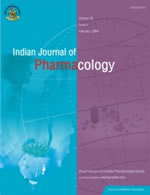
|
Indian Journal of Pharmacology
Medknow Publications on behalf of Indian Pharmacological Society
ISSN: 0253-7613
EISSN: 0253-7613
Vol. 41, No. 4, 2009, pp. 201-202
|
 Bioline Code: ph09055
Bioline Code: ph09055
Full paper language: English
Document type: Case Report
Document available free of charge
|
|
|
Indian Journal of Pharmacology, Vol. 41, No. 4, 2009, pp. 201-202
| en |
Relapse of tardive dyskinesia due to reduction in clozapine dose
Shrivastava, Meena; Solanke, Bhupendra; Dakhale, Ganesh; Somani, Abhishek & Waradkar, Pravir
Abstract
Clozapine is a second-generation (atypical) antipsychotic agent, which has been proven efficient against the positive and negative symptoms of schizophrenia, with a low propensity to induce tardive dyskinesia (TD). Compared with typical antipsychotics, it has a greater affinity for dopamine D4 than D2 receptors and additional action on serotonin 5-HT 2A receptors. Due to its weak D 2 blocking action, it produces few extra pyramidal side effects and TD is rare. TD is one of the muscular side effects of antipsychotic drugs, especially the older generation like haloperidol. TD does not occur until after many months or years of taking antipsychotic drugs. TD is primarily characterized by abnormal involuntary movements of the tongue, lips or jaw, as well as facial grimacing or extremities that develop in association with the use of antipsychotic medications. TD can be embarrassing to the affected patient in public. The movements disappear during sleep and women are at greater risk than men for developing TD.
Keywords
Clozapine, relapsed case, tardive diskinesia
|
| |
© Copyright 2009 Indian Journal of Pharmacology.
Alternative site location: http://www.ijp-online.com
|
|
